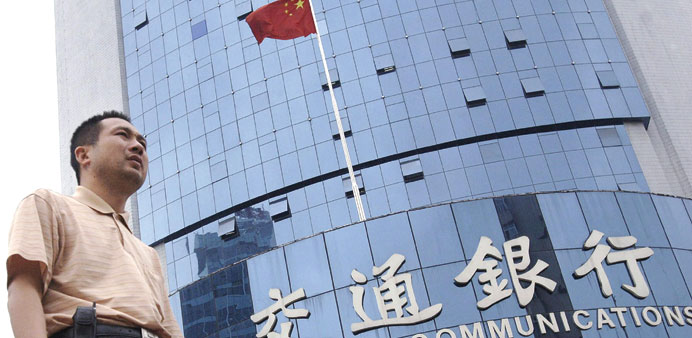A man walks past a Bank of Communications branch in Hefei, Anhui province. The bank, one of China’s largest lenders, said it is looking at options to boost private ownership.
Dow Jones/Beijing
China is trying again to shake up its stodgy state-owned enterprises. Investors are right to ask whether these moves are truly transformative.
The current buzzword in Beijing is “mixed ownership,” Communist Party jargon for introducing more private capital into government assets. Beijing hopes that this can nudge state-owned enterprises to be more commercially oriented, making the overall economy more efficient.
The reform push will soon reach state-owned banks, the linchpin of the financial system. Bank of Communications, one of the nation’s largest lenders, said last month it is looking at options to boost private ownership, though it didn’t elaborate.
At Bank of Communications, however, ownership is already quite mixed. HSBC holds a 19% stake, and the free float is 35%, relatively high for an SOE. The Ministry of Finance’s direct holding is just 26.5%, though investments by the state pension fund and other SOEs keep government ownership near 50%.
The obvious way for SOEs to raise private ownership would be simply to increase their free floats by selling state shares on the open market. But Beijing will want to preserve control in key industries such as banking and oil, so it is unlikely to become a minority investor in those companies. Historically, state sell-downs have depressed SOE share prices, something the leadership seems keen to avoid.
The government’s own regulations are also a barrier, as it is forbidden to sell state assets at below book value. Many of the banks trade below that level, though, a sign of investor scepticism toward loan quality, which itself is a reflection of why reforms are needed in the first place. Bank of Communications’ Hong Kong shares trade at 0.77 times book value. So what more could be done? China Petroleum & Chemical, or Sinopec, for instance, is selling a minority stake in its gas station business to outside investors. Analysts speculate the banks could take a similar approach and seek outside investment in key businesses such as credit cards.
At Bank of Communications, another possibility is for management to own part of the company through share-based compensation. A group of bank executives took the unusual step of buying some shares in the Shanghai market earlier this year. In theory, this should align management’s incentives with shareholders. But in reality, top management continues to be appointed by and beholden to the Communist Party.
Companies that have announced ownership reform plans have seen share prices jump. So there are near-term gains for investors who can anticipate future candidates. Bank of Communications shares rose 6% the day news emerged it would be pursuing reforms, even without details.

